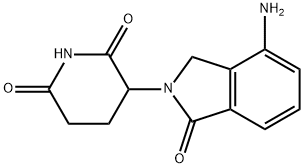레날리도마이드 C화학적 특성, 용도, 생산
개요
Lenalidomide is a kind of antitumor drugs that developed by American biological pharmaceutical companies. Its chemical structure is similar with thalidomide. It differing in the presence of an amino moiety in the 4-position and removal of one of the carbonyls of the phthaloyl ring. This derivative evolved from a structural-based effort to eliminate the adverse effects (somnolence, neuropathy, and teratogenicity) of thalidomide while maintaining or enhancing the appealing attributes. It has many functions such as anti-tumor, immune regulation and anti-angiogenesis. It can inhibit the secretion of inflammatory cytokines, and increase the secretion of peripheral blood mononuclear anti-inflammatory cytokines. Vitro tests show that lenalidomide can inhibit the hyperplasia of some cell lines such as namalwa cell. It can inhibit the growth of patients’ multiple myeloma cells and MM1S cell. In addition, lenalidomide also can inhibit the expression of oxidase-2 (COX-2), but it has no effect on COX-1. Two multicenter randomized double-blind placebo-controlled clinical studies evaluate the safety and curative effect of lenalidomide that is used for multiple myeloma. The primary efficacy end point of the studies is time to progression (TTP). The interim analysis shows that TTP of the combination group is significantly superior to dexamethasone group. Recent clinical research results show that lenalidomide not only has curative effect on treating MDS and MM, but also on treating myeloma, leukemia, metastatic renal cell carcinoma, solid tumor, idiopathic generalized amyloidosis and systemic bone marrow fibrosis disease with marrow unripe.
화학적 성질
Yellow Solid
역사
In December 2005, the US Food and Drug Administration (FDA) approved lenalidomide to be used in the treatment of myelodysplastic syndrome (MDS).
In March 2006, the FDA approved lenalidomide that was produced by American Celgene Biological Pharmaceutical Companies to be used in the treatment of multiple myeloma (MM).
On September 23, 2011, the European Medicines Agency (EMA) released information that they have confirmed that the benefits of lenalidomide(trade name: Revlimid) to be used in the treatment of patients group that was approved outweighed the risks. Meanwhile they warned the doctor the risk of the drug to cause new cancer cases. Lenalidomide has been used with dexamethasone to treat adult patients with multiple myeloma that has received at least one treatment. Three new studies show that the incidence of new cancer will be increased in the patients with newly diagnosed multiple myeloma treated by lenalidomide and other combined treatment increased incidence of cancer.
용도
Lenalidomide (Revlimid, CC-5013) is a TNF-α secretion inhibitor with IC50 of 13 nM.
용도
Lenalidomide is a thalidomide analog known to have immunomodulatory properties. Lenalidomide inhibits TNF-alpha production, stimulates T cells, reduces serum levels of the cytokines vascular endothelial growth factor (VEGF) and basic fibroblast growth factor (bFGF), and inhibits angiogenesis. This agent also promotes G1 cell cycle arrest and apoptosis of malignant cells. It is used in the therapy of multiple myeloma.
정의
ChEBI: Lenalidomide is a dicarboximide that consists of 1-oxoisoindoline bearing an amino substituent at position 4 and a 2,6-dioxopiperidin-3-yl group at position 2. Inhibits the secretion of TNF-alpha. It has a role as an angiogenesis inhibitor, an antineoplastic agent and an immunomodulator. It is a member of isoindoles, a dicarboximide, a member of piperidones and an aromatic amine.
benefits
Lenalidomide is used to treat various types of cancers. It works by slowing or stopping the growth of cancer cells. It is also used to treat anemia in patients with certain blood/bone marrow disorders (myelodysplastic syndromes-MDS). Lenalidomide may lessen the need for blood transfusions.
레날리도마이드 준비 용품 및 원자재
원자재
준비 용품







